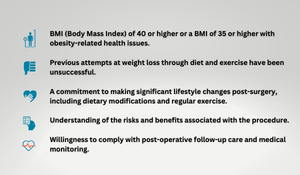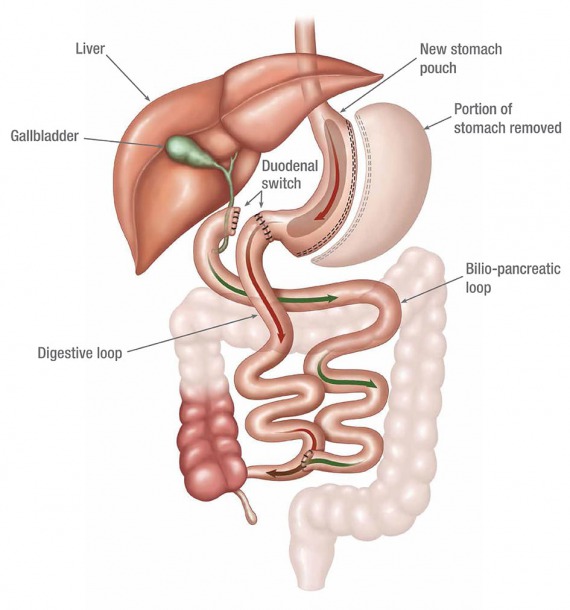The biliopancreatic diversion with duodenal switch (BPD/DS) is a well-established weight-loss surgical procedure that provides excellent weight loss and long-term resolution of health conditions associated with obesity. This operation is usually, but not always, reserved for the extremely obese (with a BMI of greater than 50) because this surgery tends to result in more significant weight loss compared to other weight loss procedures.
Some of our patients lose anywhere from 60-85% of excess body weight.
Aside from limiting the amount of food one can eat, evidence suggests it also helps reduce the chemicals produced by the stomach that trigger hunger and eating. Unlike the Roux-n-Y gastric bypass, the Duodenal Switch keeps the pyloric valve between the stomach and small intestine intact, reducing dumping syndrome, marginal ulcers, stoma closures and blockages. These are the possible side effects observed in patients who have had other gastric bypass procedures but not with duodenal switch surgery.
Who is a Good Candidate for the Duodenal Switch?
If you have diabetes or hypertension, the DS is the most effective surgical weight loss procedure for treating these conditions.
If you are determined to prevent weight regain, the duodenal switch has the best rate of losing weight and keeping it off.
If you have had a previous procedure (Lap-band, gastric bypass or sleeve) and have regained weight, the duodenal switch can help you lose that weight – and keep it off.
If you need to lose a lot of weight, the DS can help you lose more weight compared to other weight loss procedures; however, you must commit to lifelong vitamin replacement and close monitoring by your weight loss surgeon.

The duodenal switch is not typically recommended for individuals who are only mildly overweight or who do not have obesity-related health issues. It’s important to consult with a qualified healthcare provider, such as a bariatric surgeon, to determine if the duodenal switch is the right choice for you.
What are the Risks?
As for safety, all surgical procedures come with risks, and the duodenal switch is no exception. Some potential risks and complications associated with this surgery include:
- Nutritional deficiencies: Due to the malabsorptive aspect of the procedure, individuals may experience vitamin and mineral deficiencies, such as vitamin D, calcium, iron, and vitamin B12. Lifelong supplementation and regular monitoring of nutritional levels are essential.
- Dumping syndrome: This occurs when food moves too quickly from the stomach into the small intestine, leading to symptoms like nausea, diarrhea, and sweating.
- Gastric leaks and infections: Any surgical procedure carries a risk of complications like leaks at the surgical sites or infections.
- Ulcers: Peptic ulcers may develop in some cases due to changes in stomach acid production.
- Changes in bowel habits: Patients may experience more frequent and loose bowel movements.
- Gallstones: The rapid weight loss following the duodenal switch can increase the risk of gallstone formation.
- Long-term lifestyle changes: Patients must commit to a lifelong regimen of dietary modifications, exercise, and regular follow-ups with their doctor.
The safety and success of the duodenal switch depend on several factors, including the surgeon’s expertise and the patient’s adherence to post-operative guidelines and lifestyle changes. It’s crucial to discuss all potential risks and benefits with your doctor and carefully consider your individual circumstances before undergoing this procedure.
How Much Will a DS Cost?
The cost of surgery depends on many factors. If you have insurance that provides bariatric surgery benefits, your out-of-pocket expense could be between $2,500 – $5,000. If you’ve met your deductible and/or maximum out-of-pocket, your cost could be just a few hundred dollars. Unfortunately, many insurance policies don’t cover the cost of bariatric surgery; however, financing is available through companies like CareCredit. And don’t forget about HSA and Flex-Spending accounts – those can be used to pay for the procedure as well.
When you consider how much you’re spending on food, medication, health care expenses and other weight-loss programs, you’ll find that surgery will actually save you money in the long run!
What Should You Do Now?
Arriving at the decision to have weight loss surgery isn’t one that’s done quickly. So if your journey has brought you to the point of considering surgery, the next step is to meet with a qualified surgeon to discuss your options. Our physicians have performed thousands of successful procedures and use the most advanced robotic techniques to help minimize recovery time, reduce discomfort and lower the potential for complications. Schedule your initial consultation today to get started. We think you’ll appreciate our approach – No blame. No shame. Just compassionate care that gets results!


